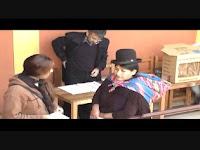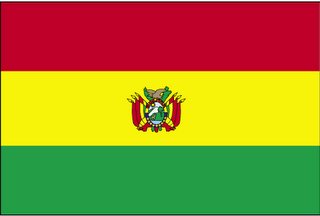Morales’ Mandate for Change Wins
The second place presidential candidate Manfred Reyes Villa of the Progress Plan for Bolivia party gained almost 28% of the national vote. And only 6% of the electorate voted for Samuel Doria Medina of the National Unity party.
MAS won 25 seats in the 36-member Chamber of Departmental Representatives (Senate) and 88 seats in the 130-member Chamber of Deputies (House of Representatives). With a majority in the Executive and Legislature, MAS has a greater chance to advance its social agenda over the next five yea
 rs. Morales and his Vice-President Alvaro Garcia Linera will remain in office until 2012.
rs. Morales and his Vice-President Alvaro Garcia Linera will remain in office until 2012.More than 5.1 million Bolivians voted – 4,969,423 in-country and another 169,096 in Argentina, Brazil, Spain and the United States. Of those voting abroad, almost 70% voted for President Morales.
Residents also voted in the departments of Cochabamba, La Paz, Potosi, Oruro, Chuquisaca and the El Chaco region on autonomy referendums. The referendums passed overwhelmingly from 73% in Oruro to 80% in La Paz and El Chaco. Bolivia’s other four departments (Santa Cruz, Beni, Pando and Tarija) were excluded from holding autonomy referendums since these departments held unsanctioned votes for regional autonomy in 2006.
Numbers are based upon exit polls. Official results from the National Electoral Court (CNE) have yet to be confirmed.
Voting Day Observations
Walking around La Paz, the streets were empty as restrictions on vehicles eliminated the usual rush of city traffic. Polls were open for eight hours throughout the country from 8 am until 5 pm. In Bolivia, voting is obligatory and elections take place on Sunday. Businesses close and due to government restrictions on vehicles, most cars remain off the streets.
Communities come together to vote at local schools where entire families congregate. Children vote with their parents and families bring along their pets. Impromptu food stands pop up outside of polling sites where local residents use the time to earn a little extra money.
At a polling station in the Sopacachi area of La Paz, voters had a varied range of opinions. Some supported the democratic process and believed the government’s economic and social programs were improving the country. Others expressed concern about a clear MAS majority.

Each person who spoke on the issue of autonomy felt that it was a positive reform for Bolivia’s departments. It would allow local representatives greater control to govern fiscal resources.
Departmental autonomy has been one of the most intense issues within Bolivia in recent years. It became a cause célèbre for those opposed to the central government in La Paz and a force for violent conflict within the country during 2006.
Peace and Transparency
Overall over 4,200 international and national observers were on hand for Sunday’s vote. Around 300 international observers arrived in Bolivia from organizations such as the European Union, Organization of American States (OAS), Mercosur and the Carter Center.

At a press conference Sunday evening, international and national observers were in agreement that the day was calm and the voting process was transparent and without irregularities.
“I have complete confidence in the electoral court and the results of the vote,” said Dr. Roshina, head of the Mission of Observers from Mercosur.
The Carter Center - based in Atlanta, GA - sent 18 international observers. A team of observers were in Bolivia in January 2009 to observe the national constitutional referendum vote. The Carter Center has held a field office in La Paz since 2007 and has been involved in democracy-building projects in Bolivia since 2002.
According to Dr. Jennifer McCoy – head of the Carter Center mission – preliminary reports from observers in the departments of Cochabamba, Santa Cruz and La Paz indicate that Sunday’s vote was calm, without any irregularities.
“All the reports we’ve received so far have been positive. Overall it was a peaceful day and orderly,” said Dr. McCoy. “We’re still waiting to get all the reports from our observers and other observers to give a full review, but up until now it seems to have gone fairly well.”
Sunday’s election was the first time that the Bolivian government used a new biometric voter registration system. From August 1 to October 15, more than 5 million voters were registered using a highly sophisticated system that cataloged digital photographs and fingerprints for each potential voter into a database.
One of several challenges facing the Morales government is how to implement departmental autonomy and provisions within the nation’s new constitution that was passed in January. Right now the question remains whether or not MAS will have the numbers necessary to push their agenda through Congress over the next five years.
“What will be important as well is to look at the Congress - both chambers, the upper and lower chambers,” explained Dr. McCoy about the level of pluralism that may characterize the near future of Bolivia’s Plurinational Legislative Assembly.
“Does the MAS - the governing party- win a simple majority? Does it win a two-thirds majority that gives it more leeway to pass by itself organic laws or proposals to reform the Constitution?” asked McCoy. “Those are the questions that we need to wait and see the official results.”
MAS Support
Previously the opposition claimed that Morales was polarizing the country. His attention to the poor, indigenous majority was causing divisions within the country. However at each opportunity, Morales’ support has intensified.
In a recall referendum held in August 2008 in which voters could accept or reject Morales and their departmental governors, Morales won nationally by 67 percent. In contrast, Cochabambinos voted Manfred Reyes Villa out of the Cochabamba governor’s office by a 2:1 margin.
These numbers demonstrate is that even if the opposition had been able to pull together a united front, Morales and MAS possess a high level of support among the majority of Bolivia’s population.
Morales started his day voting in the department of Cochabamba but returned to La Paz on Sunday evening to address thousands of supporters who crowded into the Plaza Murillo.
From the balcony of the Governmental Palace, Morales thanked the people of Bolivia for their participation, stating that now the president and vice president have five more years to serve the people.
"We have an enormous responsibility to Bolivia, but also to life and humanity, to deepen and accelerate the process of change."

Photos: Digital Warrior Media
Labels: karah woodward Bolivia Evo Morales election MAS autonomy observers Dr. Jennifer McCoy Carter Center










